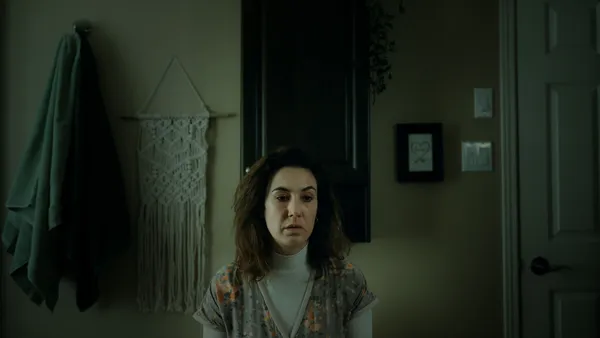 |
| Karine Gonthier-Hyndman in Frimas |
It’s that time of year again when the short films eligible for Oscar contention are emerging. As an admirer of 2019’s Marguerite, I was delighted to see another film by its director, Marianne Farley, in the running. When we met up to chat about it she said that she was sure she knew of me from somewhere too, and we worked out that it was probably my interview earlier this year with Les Nôtres director Jeanne Leblanc - Jeanne is a close friend of hers and she starred in the film as the mother of a young pregnant girl.
Her new film, Frimas, deals with a different kind of crisis emerging from pregnancy. It stars Karine Gonthier-Hyndman as Kara, a woman living in a near future Canada where abortion is illegal, resorting to desperate measures to access it anyway. An impressive piece of work, as one would expect from Marianne, it makes a bold statement which reflects concerns of great importance to her, and which feels intensely relevant to the present moment.
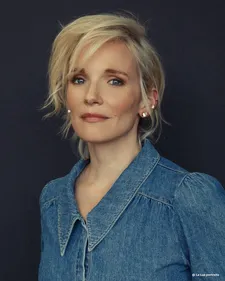 |
| Marianne Farley Photo: La Luz Portraits |
“My feeling about about abortion rights is that there's a risk of it happening pretty much everywhere around around the world,” she says, “in the sense that, you know, the past five years have proven that whatever you expect, the opposite can also happen, and how, and how polarised society has become, and how we're bringing back these racial issues and we're bringing back things about women's rights. I feel like we're relatively safe in Canada from things turning around, but we're living in such a polarised world that it's something that wouldn't surprise me. I've been reading up on Roe v Wade for years and years, and how there is an agenda to overturn Roe v. Wade. One of the reasons why I started this film three years ago was that I was really scared for women around the world that this was going to happen, and it's happening right now, which is really scary.”
It addresses something which doesn’t often come up in polarised debate about the subject, which is that some abortions involve pregnancies which were very much wanted, but simply cannot be continued.
“For me, I'm really 100% pro choice, and I always have been,” she says. “I understand that some people aren't comfortable with abortions and I understand that some people don't like to think about abortions and don't believe in abortion, but for me, the bottom line is women have a right to choose. You know, the government can't force you to give up a kidney to save a life, why should the government decide that a woman has to go through a pregnancy and deliver a baby that she is not able to support? Or whatever reasons. For me, it goes back to fundamental human rights and gender equality. If there are no laws that that govern a man's body than there should be no laws that govern a woman's body. So yeah, I don't know if I can actually convince people who are anti abortion, but I feel that that's the power of cinema. I want to make films that speak to me socially and emotionally.”
Kara’s suffering in the film is caused partly by the effect of the new law, and the attitudes behind it, on conversation. Not only does she suffer physically and find the process emotionally traumatic, she’s not able to access support afterwards, or even tell her husband about it.
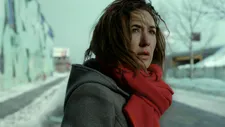 |
| Kara looks for help |
“Well, yeah. I mean, that's the reality. Women are going to have abortions whether they're safe or not, and that's that's the tragedy of it. It's how these women are forced to carry this on their own emotionally and how lonely it gets for women who need to get an abortion in a society where it's prohibited and where they're putting their lives in. danger. I find it really tragic that, you know, I think it's 25 million women a year around the world have illegal abortions. That's a lot, and and a lot of them die in the process too. So for me it goes back to women are going to get abortions – can they do so safely without risking their lives? Or are we going to force them to do this and have to deal with the devastating repercussions of it both physically and emotionally?”
Reflecting that loneliness is the film’s title, and the metaphor of the cold and the frost.
“The definition in French is really tricky to translate,” she says. “It's like a thick fog that turns into ice as it falls down. So for me, it's also a metaphor when it comes to abortion rights. I would say, last year, like two years ago, we felt like we were safe from things going back to what they were in the 1960s and ‘70s. But we're actually blinded by that. We think that that we're never going to go back to that, but it's happening right now, you know? Mississippi is going to court in December, and if Roe v Wade is overturned, that's 22 States where women will lose the right to get an abortion, which I find really just tragic.”
And whilst we focus on Kara and her emotional arc, there's also a lot going on in the background with the supporting characters. It seems that there's no way they could be getting paid enough to risk life in prison, so there's obviously something else going on with their motivation.
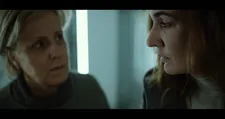 |
| A doctor who will do what she can |
“A lot of people risk their lives to help women in these situations,” she says. “And of course there is money involved. I think there has to be. I don't know if you've seen the movie 4 Months, 3 Weeks And 2 Days, which is an incredible Romanian film, one of my favourite films. I didn't want the doctor to be that kind of doctor where she, or he, just doesn't care about anything and has no conscience. Really, he's kind of a jerk. I wanted it to be a little more balanced, I wanted the characters to have strong convictions. But also, you know, this is how they earn a living. And if you're going to do this and put your life in danger, you have to get paid for it. So yeah, I tried to find a balance between both. I didn't want them to be just one dimensional and just there for the money, or they're just there for the cause.”
There’s a suggestion in 4 Months, 3 Weeks And 2 Days and in her film, that people in that situation are under pressure to lie about their circumstances and their medical history, so they're at risk even with a good doctor.
“Yes. I think when you when you put women in that kind of position, they try to survive the best they can. In Frimas, Kara has just learned that her that the foetus she's carrying is not going to survive, and she just can't bear the idea of having to carry this baby and have it die in her arms. It's a really cruel thing, you know, and she knows that even in underground abortion clinics she won’t be able to find a doctor who will help her. So that's why she lies. It's a survival instinct, I think.”
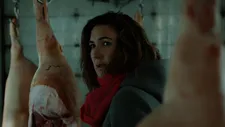 |
| Riding in the meat truck |
So when it comes to the framing of the film, how Marianne you decide what kind of environment she wanted to place Kara in?
“I wanted it to feel contemporary, I didn't want it to be like, it's like 20 years down the line. That was really important to me. You know, it's an anticipation, but it's not The Handmaid's Tale where society has completely changed. We're moving towards a society that's farther to the right and a bit of a police state, but I also wanted it to feel real, so I tried to find that balance. And with the meat truck and all that it was, you know, what’s really clear to me is if we take away those rights from women, then we’re treating them like a piece of meat, like animals. It just it all came together for me. I had a really clear idea of what I wanted to make.”
How does she feel about its chances where the Oscars are concerned?
“I don't know. You never know. Like, I didn't know with Marguerite at all. You know, we ended up getting a nomination for it. And I don't know, I don't want to think about it too much. I have to do my work and I did, and I just I really believe in the message of this film. And I really believe in the message of Marguerite as well, which was a completely different message but it's still really important to me.”
Having received all this praise for her work as a director, how does she see her career taking shape in the future? Will acting remain her mainstay or does she plan to focus more on directing?
“The last thing I played in was Les Nôtres, actually – Jeanne’s film. I actually have a feature film coming out called North Of Albany. I'm completing the post-production phase, I shot it in the fall of last year, and we should be done sometime before Christmas. And I have a few other features in development, one that I'm hoping to shoot next year. So yeah, definitely. I wanted to make a feature with Frimas, I have to say, at first, but then I decided to do a short because I wanted to put that message out there and I think we're starting to move ahead in a really dark direction.”





















